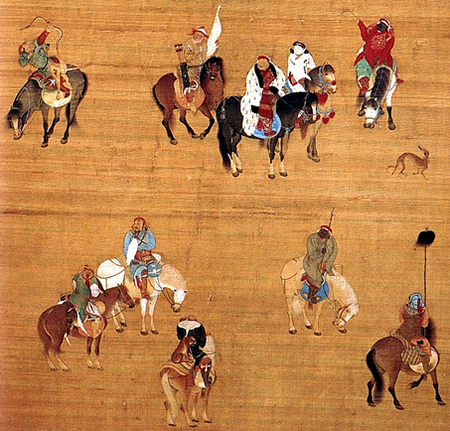 |
| Kubilai Khan |
Kubilai or Khubilai was born in 1215, the second son of Tului Khan (youngest son of Genghis Khan) and Sorghaghtani Beki, who was a Kerait (a tribe that Genghis had conquered) and a Nestorian Christian (his principal wife, Chabi, was also a Kerait and Nestorian Christian).
His mother was very influential in all her four sons’ upbringing; she had them learn to read Mongol (but not Chinese) and to administer as well as ride, hunt, and fight. When Ogotai Khan (Tului’s elder brother) became khaghan (grand khan), Sorghaghtani Beki obtained appanages (fiefs) for both herself and Kubilai in north China.
While his elder brother Mongke Khan participated in the great Mongol campaign to conquer Europe that began in 1236, Kubilai remained behind, learning to administer his appanage and learning about Zen (Ch’an) Buddhism and Confucianism from prominent scholars in both fields.
  |
These experiences marked him as a different kind of leader from most of his relatives. He also realized the harm that the wars and Mongol plundering armies had done to the Chinese economy and society, and how granting appanages to Mongol lords harmed the authority of the central government.
The election of Mongke as the fourth khaghan in 1251 became Kubilai’s stepping-stone to power. In his quest to expand the Mongol realm, Mongke appointed one brother, Hulagu Khan, to conquer the Middle East, and Kubilai to conquer a kingdom called Nanchao or Dali (T’a-li) in present day Yunnan province in China.
Kubilai completed his task in 1254, and Dali was put under Mongol control. In 1258 Mongke launched his main campaign against the Southern Song (Sung) dynasty in which he and Kubilai each led a wing of the invading army.
Mongke’s death in the next year precipitated a succession crisis. Traditionalist Mongols and supporters of Arik Boke, Tului’s youngest son, convened a khuriltai or council that had representatives from the other branches of Genghis Khan’s clan, which elected him khaghan.
 |
| Kublai Khan on a hunting expedition |
Kubilai also convened a khuriltai, in his appanage, attended by his supporters that elected him to the same position. In the ensuing civil war Kubilai had the support of Hulagu and also the greater resources of China. Arik Boke surrendered in 1264 and died two years later under Kubilai’s supervision.
Kubilai’s ascension marked his transition from Mongol khaghan to emperor of China. In 1254 he had chosen a site in northern China located 200 miles north of present-day Beijing as his capital, arguing that it was logical to be located where he governed. It was called Shangtu meaning “supreme capital” in Chinese.
It became the secondary capital in 1264 when he moved the seat of his government to the former Liao and Jin (Chin) capital, which he rebuilt and renamed Datu, or Tatu (“great capital” in Chinese); its location is present day Beijing. As a result Karakorum, built by Ogotai Khan as capital of the whole Mongol Empire, was relegated to the backwaters.
   |
From this time on Kubilai chose a Chinese reign name, proclaimed a calendar, adopted many Confucian rituals of state, and in outward form at least became a Chinese-style ruler. In 1271 he proclaimed himself the founder of the Great Yuan dynasty (1279–1368) and claimed that it had received the Mandate of Heaven as the latest in the succession of Chinese dynasties. Between 1267 and 1279 his forces finished off the Southern Song, capturing its capital Hangzhou (Hangchou) in 1276.
Several campaigns occupied the remainder of Kubilai’s reign. One was to subjugate Korea, whose king had been subservient until a coup in 1269 brought in an independent leader. It ended in 1273 with Korea back in the Mongol fold. Kubilai also launched two expeditions to force Japan to accept tributary status.
The first one in 1274 landed at Hataka on the eastern coast of Kyushu island and met with resistance and disaster because of a gale-force storm. A huge second expedition, two armadas of 140,000 men, mostly Koreans and Chinese plus a Mongol cavalry, were devastated by a typhoon.
A naval expedition against Java in 1292–93 was also a fiasco. Land invasions of Burma and Vietnam were more fortunate and secured their vassalage. The wars against Kaidu Khan (1235–c.1301) were more difficult and reflected the division between the different branches and ideologies among Genghis Khan’s descendants.
Kaidu was Ogotai Khan’s grandson and his cause showed the resentment of that branch of the family on its eclipse. Kaidu’s allies were princes from the Chagatai and Tului families who objected to Kubilai’s identification with his sedentary Chinese subjects. Their causes failed but they continued to be troublesome.
Kubilai needed to be accepted as sovereign of China while remaining leader of the Mongols. Therefore he continued the shamanitic practices of his ancestors while turning to Tibetan Buddhism and ordered the creation of a new alphabet based on Tibetan for writing the Mongolian language (an earlier script was based on Uighur).
While favoring non-Chinese Central Asians in top posts in his government, he also honored Confucius and continued Chinese traditions such as authorizing historical writings and cultural activities. Kubilai Khan’s administration was by Mongols and for the benefit of Mongols.
The death of his wife Chabi in 1281 and son and heir Prince Zhenjin in 1285 was a personal and dynastic loss, because Zhenjin had been given a good Chinese education and had he lived there might have been improved relations between Mongols and Chinese. Kubilai increasingly took to feasting and heavy drinking in his last years and died in 1294.